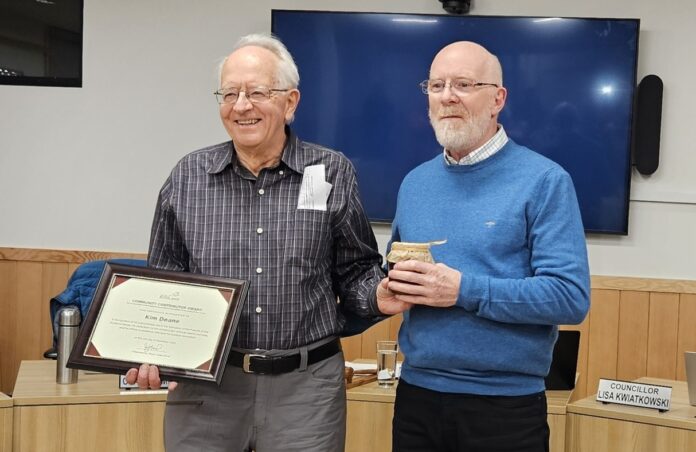For his work leading the Friends of the Rossland Range, the City of Rossland has named Kim Deane the recipient of its 2023 Community Contributor Award.
Deane was nominated under the community commitment, environment, and heritage categories. The city said he has been instrumental in the non-profit group’s work to establish a recreation area and the construction “of the many cabins we all love and enjoy.”
Mayor Andy Morel said the award is “extremely well deserved as Kim very much represents Rossland’s commitment to the environment, outdoor recreation lifestyle, community and family.”
Deane said he was “very surprised but really very pleased” with the award, which a neighbour nominated him for. He said he considers it recognition of the considerable efforts he and others have put in for more than 20 years.
Deane explained the Friends of the Rossland Range got their start in the early 2000s when a commercial snow-cat operation was proposed for the area, which had long been home to shacks scattered through the woods known as Booty’s cabins after local ski legend Booty Griffiths. Gradually the public became more aware of these shelters and began to use them.
“When this application came along to take over the area with a commercial snow-cat, the community rose up,” Deane said. “We had a big meeting at the Miners’ Hall where people said ‘that can’t happen, it’s too important for the public.'”
Deane and a few others found themselves tasked with doing something about it. In the face of public opinion, the snow-cat operator soon found an alternate location. But for the group that became the Friends of the Rossland Range, it was the just the start of what Deane calls “12 years of beating the drum with the provincial government.”
But it was worth the wait, for in the end “we got much more than we ever hoped for: a very large area and nine cabins.”
The arrangement meant the existing 15 or 20 wood and plastic shelters had to go, replaced by above-ground, rodent-proof, insulated cabins. Construction began in 2015 and a tenth one was completed last year. They raised the money, provided the materials and then found volunteer builders, of which there was no shortage.
“It seems to be in Canadian DNA. People love to build cabins on lakes or in the wilderness,” Deane said. “We could almost auction off the rights to build a cabin. Groups just came forward and said ‘we’ll build you one.'”
Because they are about the size of a typical backyard shed, Deane said they are fairly simple to build and maintain. A cabin-keeper is assigned to each one to look after firewood and minor maintenance but users have to bring their own toilet paper and paper to light the stove. “They really look after themselves,” Deane said. “They’re shared really well. The public is great in that regard.”
Deane sees the cabins and the rec site in general as regional assets due to their location.
“Nature has enabled it first and foremost,” he said. “It is on a provincial highway maintained all winter so you can get to it. The terrain is moderate, leading up to more interesting mountaintops that are enough for the more advanced ski touring people, but for the average family not accustomed to the back country, the cabins up to a certain distance from the highway are all in quite mellow country. It’s just perfect for them.”
One challenge was parking. The area was so popular that at times up to 50 cars could line the highway in an area where the speed limit was 100 km/h. However, the Ministry of Highways has since allowed the Friends to use an old gravel pit and they also have permission to use the entrances to forest service roads. The group raises $6,000 to $8,000 a year to hire someone to plow those lots.
Because much of the rec site is on a logging tenure, Deane said certain replanted areas also require thinning to let skiers get through the trees.






